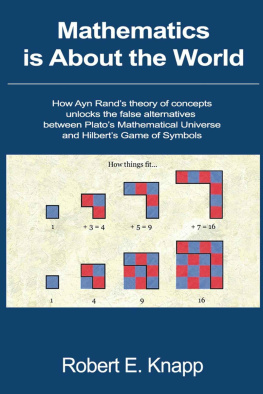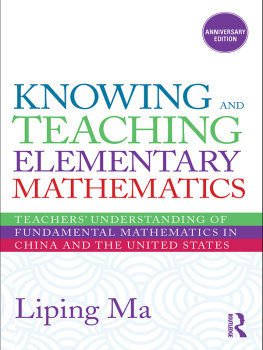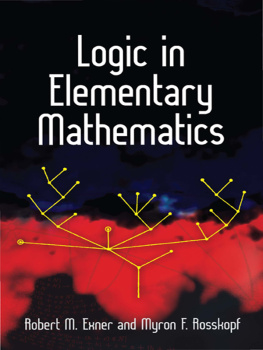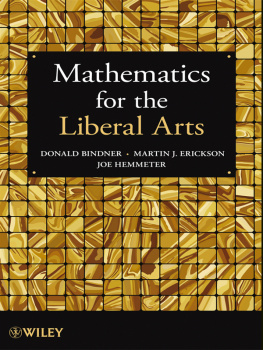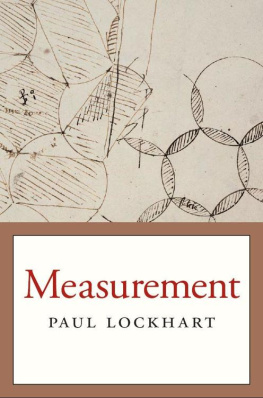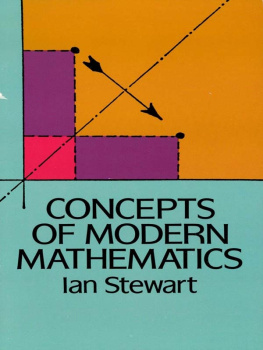MATHEMATICS
IS ABOUT THE WORLDMATHEMATICS
IS ABOUT THE WORLD
______________________
HOW AYN RANDS THEORY OF CONCEPTS
UNLOCKS THE FALSE ALTERNATIVES
BETWEEN PLATOS MATHEMATICAL UNIVERSE
AND HILBERTS GAME OF SYMBOLS
Robert E. Knapp
Copyright 2014 Robert E. Knapp
No part of this publication may be reproduced, stored in a retrieval system, ortransmitted, in any form, or by any means, electronic, mechanical, photocopying,recording, or otherwise, without the prior written consent of the author.
First Edition Visit the website for the book: www.MathematicsIsAboutTheWorld.com to findout more about the book and to contact the author.
CONTENTS
Acknowledgements7
Preface 9
PART 1: ELEMENTARY
1. Euclids Method232. Measurement and the Geometry of Magnitudes1013. Geometric Area, Proportion, and the Parallel Postulate1774. Numbers as a System of Measurements2295. Geometry and Human Cognition277
PART 2: ADVANCED
6. Set Theory and Hierarchy in Mathematics2937. Vector Spaces: A Study in Mathematical Abstraction3578. Abstract Groups and the Measurement of Symmetry425
Index489
Acknowledgements
My greatest debt is to Ayn Rands Introduction toObjectivist Epiestemology without which this book could not havebeen conceived.Publishedduring my college years, ithas illuminated my understanding and appreciation for mathematicsacross five decades.
I have been stimulated by a number of extended exchangeswith Harry Binswanger on a variety of mathematical topics. Inregards to my own work, Harry has provided welcomeencouragement and valuable ciriticism that have helped mesharpen my formulations and, indeed, saved me from severalserious mistakes.
Pat Corvinis fascinating and stimulating lectures on Zenosparadox, together with the reactions of its audience first convinced me that there was a potential audience for my own ideas andtriggered my first essays on how to look at mathematics.
Objectivist Conferences (OCON) provided my first opportunity for a public presentation of my ideas and I am gratefulfor the questions and comments from my audience, and especiallyto Ray and Rebecca Girn, Evan Picoult, and Irene Knapp whopreviewed my courses and offered many valuable comments andsuggestions.
I have received enouragement and valuable comments on chapters and/or earlier formulations of these ideas from Harry Binswanger, Raymond Knapp, Evan Picoult, Ray Girn, RebeccaGirn, Robert Rubinstein, Kenneth and Sandy Landin, Judy Knapp,and Shrikant Rangnekar.
Shrikant was particularly helpful in the earlier stages of this book, reading and critiquing every chapter as it was written, andmaking a second careful reading of the initial draft. His helpfulobservations and suggestions, interest, and encouragement was atonce helpful and very motivating. His guidance through my earlyattempts to find a publisher or an agent, though unsuccessful,netted much of the material that has made it into my preface.Throughout, his knowledge and judgement of the publishingindustry has been invaluable and his enthusiasm for my book hasbeen inspiring.
Finally, it should go without saying that all responsibilityfor both the content and presentation of that content is entirely myown.
Preface
What is mathematics about? Is there a world ofmathematics in which straight lines are infinitely straight, areinfinitely thin, and contain an uncountable infinity of points? Or,on the contrary, is mathematics a purely formal system ofdeductions from axioms, a system that is beautiful to some of us,but boring and just too difficult for the rest of us? Is it devoid, ineither case, of any worldly or other worldly content, yetmysteriously applicable to the world we inhabit? Or, finally,contrary to the nearly universal range of acceptable academic views,is mathematics about the world?
This book is written for people who care about suchquestions, people who are still looking for answers and are notsatisfied with the standard suggestions, people who are open to a common sense-yet radical-alternative.
This is the book I would have loved to find when Iencountered abstract mathematics in my high school years andlater, in college, began the process of becoming a mathematician.Its the alternative perspective I needed when I read, also in highschool, Russells Introduction to Mathematical Philosophy. Though from a far different perspective, like Russells, mine is a book onhow to think about mathematics.
My own fascination with mathematics began with a bookby Irving Adler entitled Magic House of Numbers, which I checkedout of the library in sixth grade because of the word magic in thetitle. Thus began a lifetime of interest, study, and for a brief timeresearch, in mathematics. By the end of ninth grade, with the aid ofold textbooks lying around the house, I was learning trigonometry,analytic geometry, and the beginnings of calculus.
In my sophomore year of high school, I found a copy of Birkoff and MacLanes highly regarded A Survey of ModernAlgebra in my school library. And I was struck by the opening ofChapter III, Polynomials, which reads Let D be any integraldomain, and let x be any symbol. Suppose one forms sums,products, and differences of x with the elements of D and withitself, subject to the rules of ordinary algebra
Now it is true that a polynomial defines a rule that can beapplied to any mathematical domain that employs a sensible notionof addition and multiplication. One can, for example, applypolynomials to matrices and even to other polynomials. So a polynomial has a meaning and significance as a set of rules that transcends any particular mathematical domain to which it mightbe applied.
But this is not what I took the authors to mean, nor whatthey were actually saying. Instead, I heard: Dont think ofpolynomials as meaning anything in particular. Look at them as manipulations of meaningless symbols. Well, I continued for many more pages before I returned the book to the library, but I gotnothing out of it. Such was my first encounter with abstractmathematics!
By the end of my junior high school year I had read aboutmatrices and vector spaces from an interesting perspective thatmade sense to me. Then, at some point near the end of that year or,perhaps, that summer I started learning about rings and idealsas an abstract study. I had no idea why ideals were important orwhat they were about. That rings were a general framework forstudying divisibility and factorization never occurred to me. But Iremember thinking, Rings are just a way of thinking aboutnumbers, matrices, and polynomials. From that moment, Iembraced mathematical abstraction. Yet, simultaneously, Iembraced the view that mathematics is about the world. I had glimpsed that mathematical abstractions are a way of looking atthings; neither a path to a separate mathematical world nor a playwith meaningless symbols.
During my senior year in high school I started reading, with great appreciation, Halmos great text on finite dimensional vectorspaces, presented on an abstract level, but very readable andinspiring. Later, I began, again with appreciation, my freshmanyear in college reading Dieudonnes highly abstract Foundations ofModern Analysis. Both books reinforced my belief in the power of mathematical abstraction; neither deterred me from my view thatmathematics is about the world.
At some point during my college freshman year, I realizedthat neither mathematicians nor philosophers of mathematicsshared my perspective, offering only the alternatives of formalism(a game of symbol manipulation), Platonism (a separate world ofmathematics), or, as a third, the Fregean view that mathematics isessentially a branch of logic. I could accept none of these choices.

